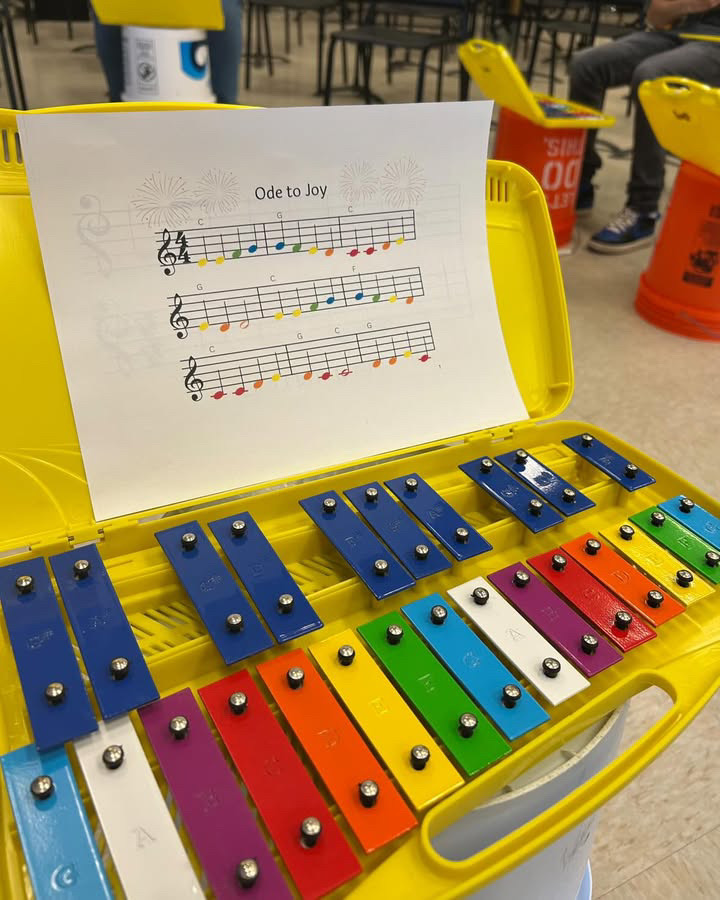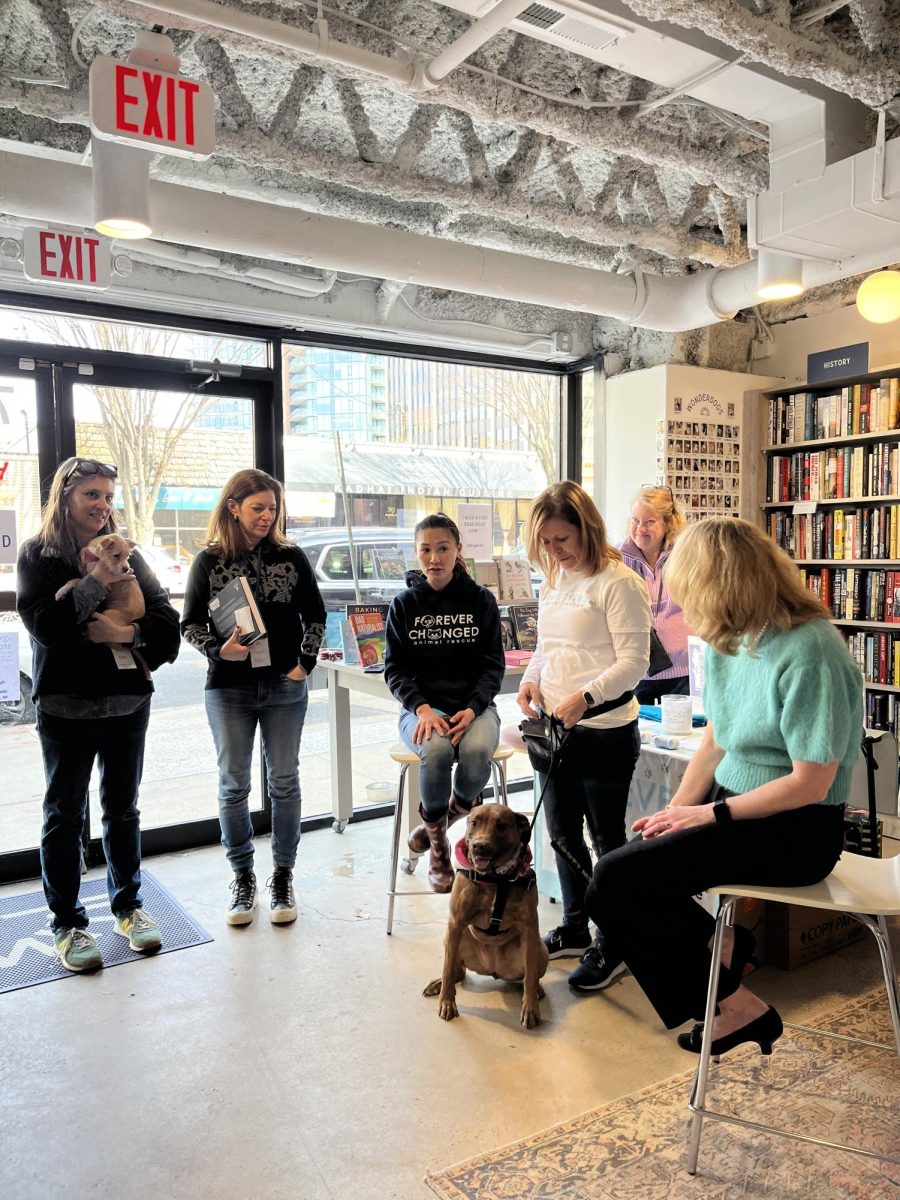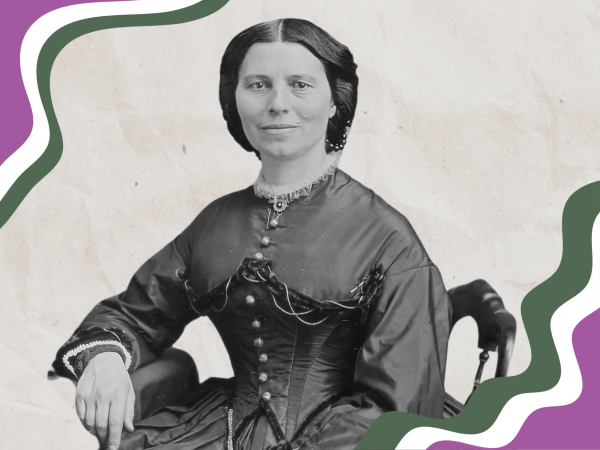‘It takes a village’: Students form learning pods during online school
February 26, 2021
Minutes before the school day begins, sophomore Addy Singer sits with three of her friends at individual folding tables, set six feet apart, in her quiet backyard. They spend the morning chatting about schoolwork, watching TikToks and getting their materials ready for their first classes. And when 9 a.m. hits, they open their Zoom tabs to join separate virtual lessons.
Singer and her friends meet up three times a week for online school in a “learning pod,” each time gathering in a different friend’s backyard. This system has made it easier to cope with the negative effects of online school, she said.
“I miss seeing people at school every day,” Singer said. “Being able to do online school with my friends makes it more bearable.”
In response to the challenges of virtual school, learning pods have sprung up nationwide. Whether it’s allowing for much needed social interaction between students during the school day, pooling money to hire tutors to enhance the learning experience or creating a homeschooling group, learning pods alleviate many of the strains online schooling has caused for families, Pyle parent Greg Harris said.
Harris’ daughter participates in a daily learning pod with four other students in her grade.
“Learning pods are a silver lining to a horrible situation,” Harris said. “It’s given families an ability to lean on each other.”
While many families have created pods with friends and neighbors, others have used outside sources to match them with a group or tutor. Marnie Weinstein, an educational consultant based in Montgomery County, has added learning pod services to her business. She helps families form their own learning pods by matching them with educators, but the expectations parents have for the pods differ, she said.
“Families who have decided to pull their kids out of schools — who want them to have a more hands-on experience — come to me to find them a teacher who can facilitate their learning,” she said. “I also have a lot of families who come to me for support for their kids who are at home doing virtual learning because they need someone to help their kids stay focused, access the different assignments and just help them through their work.”
Similar to Weinstein’s services, companies like Outschool, which offers over 50,000 online classes for students ages three through 18, have emerged in response to the high demand for learning pods. Weinstein gets calls from dozens of families each week interested in forming a pod for their children, she said.
“I have been working nonstop since the pandemic started,” Weinstein said. “Families are still having a very difficult time in online school.”
With virtual learning, the parent’s role in their children’s education has increased significantly, Weinstein said. Parents of younger students often have to set up their children’s Zoom classes, make sure they understand the material and help them with their homework. Finding the time to complete these tasks can be a struggle for many parents, said Burning Tree Elementary School parent Isabel Gonzalez.
“I was working in the office and had to change to home-based work because I saw that it gets really difficult to provide the attention the kids need, especially when both parents are at work,” Gonzalez said.
Many preschools in the area have opted to hold online class for only 30 minutes to an hour every day. This adds pressure on parents to take care of their children and diminishes important aspects of preschool education, said Gaeryl Baer, an MCPS parent who has decided to put her preschooler in a learning pod.
“One of the most important reasons that you send a child to preschool is for social-emotional learning — learning how to share and how to become friends with people,” she said. “We wanted to be able to give her that interaction.”
Private tutors who manage pods can cost hundreds of dollars per week, pricing many parents out of a comprehensive learning pod opportunity and adding to remote school inequities like poor Wi-Fi coverage, inconsistent computer access and overlapping class times with multiple students in one household.
Many parents in underprivileged communities also don’t have the facilities to host a learning pod with neighboring families. According to recent research from McKinsey & Company, a New York-based management consulting firm, low-income, Hispanic, Latinx and Black students will face the greatest learning setbacks during the pandemic. Not everyone is able to attend online school; while 90% of high-income students were found to engage in remote learning, only 60% of low-income students regularly log into online classes.
Because of their exclusive nature, private learning pods will only widen the gap in education between socioeconomic classes, according to a Washington Post analysis by Emily Oster, a professor of economics at Brown University. To address this concern, inclusive and accessible learning pod programs have formed in Montgomery County, such as Advancing Black Lives in Education and Educational Equity & Enrichment Hubs.
Not everyone can afford extensive learning pod services, but they’ve become increasingly accessible to lower income families, Weinstein said.
“You have to be more privileged to be able to hire teachers and tutors, but there’s actually a ton of resources to join pods,” she said. “It’s more and more about our kids supporting each other and less about tutors.”
Online schooling has significantly affected students’ mental health. According to a Black & White survey of almost 900 students at Whitman, 60% of students felt that quarantining has negatively impacted their mental health. For eighth grader Julia Reiskin, though, being in a pod with her friends reminds her that she’s not going through hard times alone.
“It’s more fun to be with people in person instead of just sitting there in your room by yourself, staring at a screen,” she said. “It’s more interaction than you would get when you’re alone.”
Although Singer says learning pods can alleviate school-based stress, families also have to take into account risk factors when deciding to form a pod. Many parents have implemented safety rules and regulations for each family to follow, such as limiting the number of people with whom the families come into contact and making sure the students wear masks and sanitize their hands while together. Although there’s no complete protection against COVID-19 in learning pods, the benefits outweigh the risks, Baer said.
“Pods are a way for families to try to give our children the benefits of in-person learning while being as safe in the pandemic as possible,” she said. “This school year would have been impossible without pods.”









